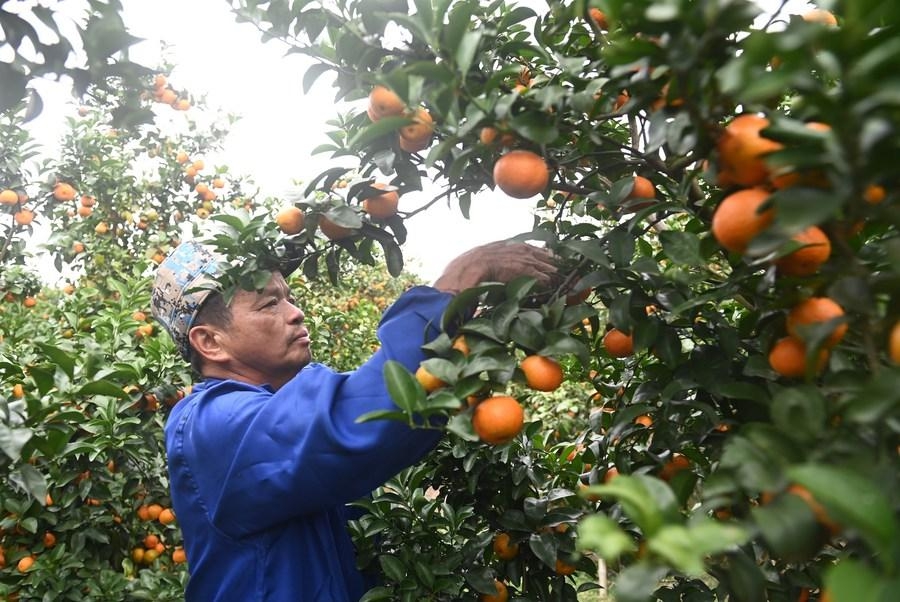




- BRNN
- BRI News
- BRNN News
- Database
Official Documents Polices and Regulations
Inter-government Documents International Cooperation BRI Countries
Business Guide Economic Data BRI Data
Trade
Investment Projects Latest projects
Cases - Content Pool
In recent years, Nanning, in south China's Guangxi Zhuang Autonomous Region, has integrated artificial intelligence into agricultural production, achieving precise decision-making, risk prevention and full-chain enhancement in farming operations. This shift has moved agriculture away from experience-based approaches toward data- and intelligence-driven practices, significantly improving productivity and resilience.
Statistics show that in the first half of this year, the city's grain planting area exceeded 3 million mu (200,000 hectares), including more than 1.9 million mu of early rice. Vegetable production, including edible fungi, grew 3.7 percent year on year, while total meat output and aquatic product output increased 3.5 percent and 4.6 percent, respectively, compared with the same period last year.

A villager picks "Shatangju" tangerines in Tongfu village of Xixiangtang district, Nanning, south China's Guangxi Zhuang Autonomous Region, Jan. 5, 2024. (Xinhua/Lu Boan)
Previously, pest and disease control relied heavily on the experience of agricultural technicians and veteran farmers. AI technology now enables proactive and precise disease prevention and control, rather than reactive responses. Fruit growers simply log into a WeChat mini program or an app on their phones, snap a photo and upload it to a section designed for citrus diseases, and AI instantly identifies the disease with 95 percent accuracy. Beyond that, growers can request free expert consultations through the app for efficient, professional citrus disease prevention services.
"The app works like an expert, helping us quickly identify and diagnose citrus diseases. It's extremely effective," said Su Jianquan, a major grower of orah mandarins — a thick-skinned citrus fruit — in Nanning's Wuming district. Thanks to timely disease detection and treatment measures, his orchards produced over 70,000 kilograms of orah mandarins last year.
The app was independently developed by Guangxi Huiyun Information Technology Co., Ltd. Growers need only photograph and upload diseased leaves or fruit. The app then uses AI, the Internet of Things and big data technology to rapidly identify pest and disease types and deliver comprehensive prevention and control solutions. This greatly improves diagnostic accuracy and shortens the time from pest discovery to treatment, effectively curbing the spread of pests and diseases.
Meanwhile, the Nanning Plant Protection Station has deployed various kinds of smart disease and pest monitoring equipment throughout the city, ensuring timely and accurate pest and disease monitoring and early warning while providing precise data support for scientific prevention and control, said an official from the Nanning municipal bureau of agriculture and rural affairs.
To date, the city has established 19 national and autonomous region-level field monitoring stations for crop pests and diseases, equipped with 80 sets of advanced instruments, including intelligent pest monitoring lamps. Through real-time monitoring by intelligent equipment, combined with field surveys conducted by technical personnel, the system can accurately predict optimal treatment periods for major pests, such as planthoppers and stem borers, thereby significantly improving efficiency.
In Nanning, AI technology is helping farmers and breeders transition from "extensive management" to "precise management."
Nanning Xixiangtang Muyuan Agriculture & Animal Husbandry Co., Ltd. currently operates seven pig farms in Tanluo town, with the annual number of pigs slaughtered reaching 460,000, making it a major pig-farming hub in Xixiangtang district.
"The company applies AI technology to pig feeding management. By analyzing each pig's growth curve, health status and environmental parameters through dynamic nutritional requirement models, we create customized feeding plans for every animal, saving approximately 50 yuan ($7) in feed costs per pig," said an executive of the company.
In addition, the company has improved its system warning response time to within five minutes and reduced disease incidence by 20–30 percent, as well as mortality rates by 15–20 percent.
AI technology now spans the entire agricultural production and sales process, helping improve the quality and brand value of Nanning's agricultural products.
In a fruit sorting workshop at Guangxi Qifeng Juzhou Fruit Industry Co., Ltd., general manager Luo Zenggui explained that orah mandarins purchased from farmers undergo preliminary processing before entering the intelligent citrus sorting line, where machines automatically sort and grade fruit by color, size, surface blemishes, sugar content, and internal damage.
Thanks to the intelligent citrus sorting line, Luo said, the fruit is strictly sorted and graded according to national standards, ensuring that premium orah mandarins command a higher price.

Tel:86-10-65363107, 86-10-65368220, 86-10-65363106